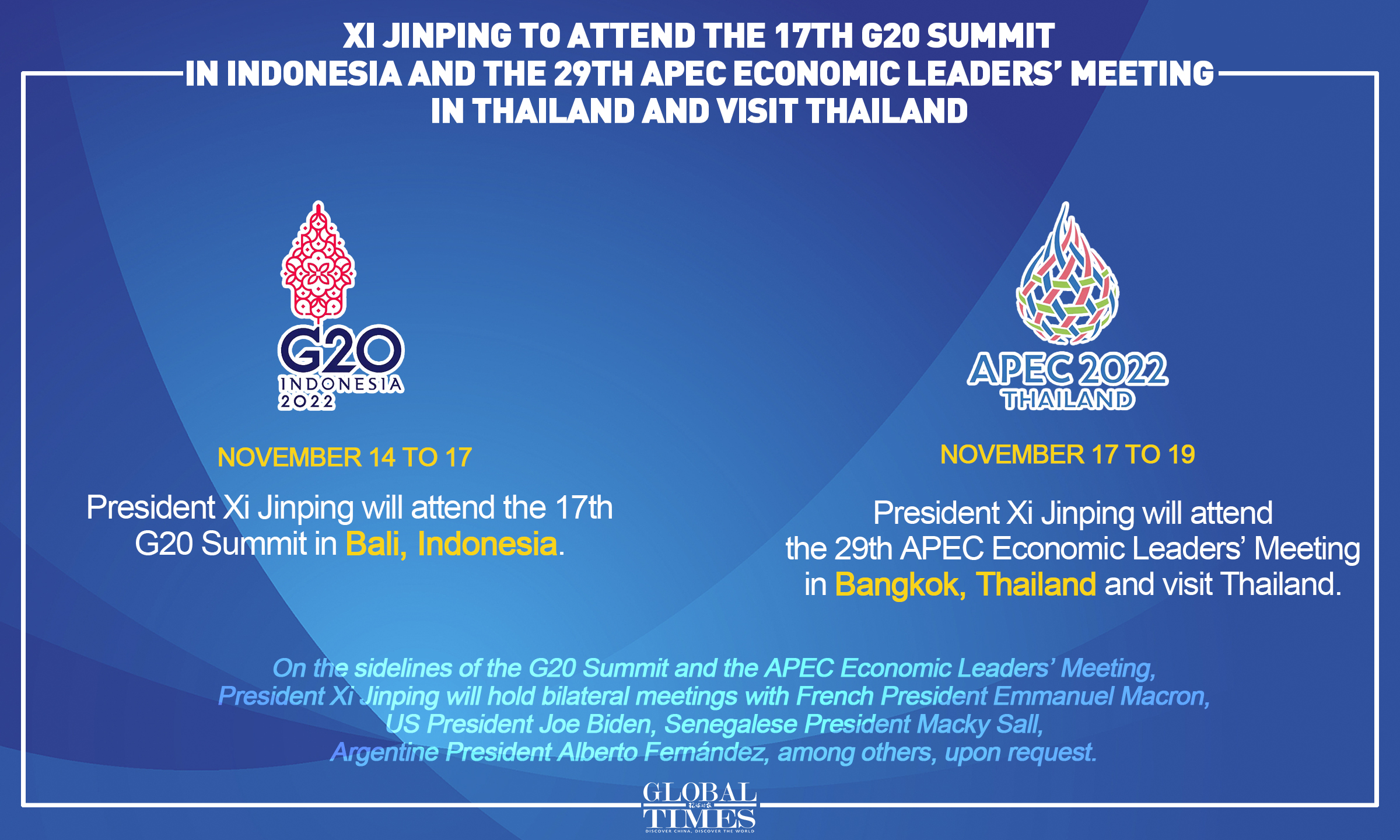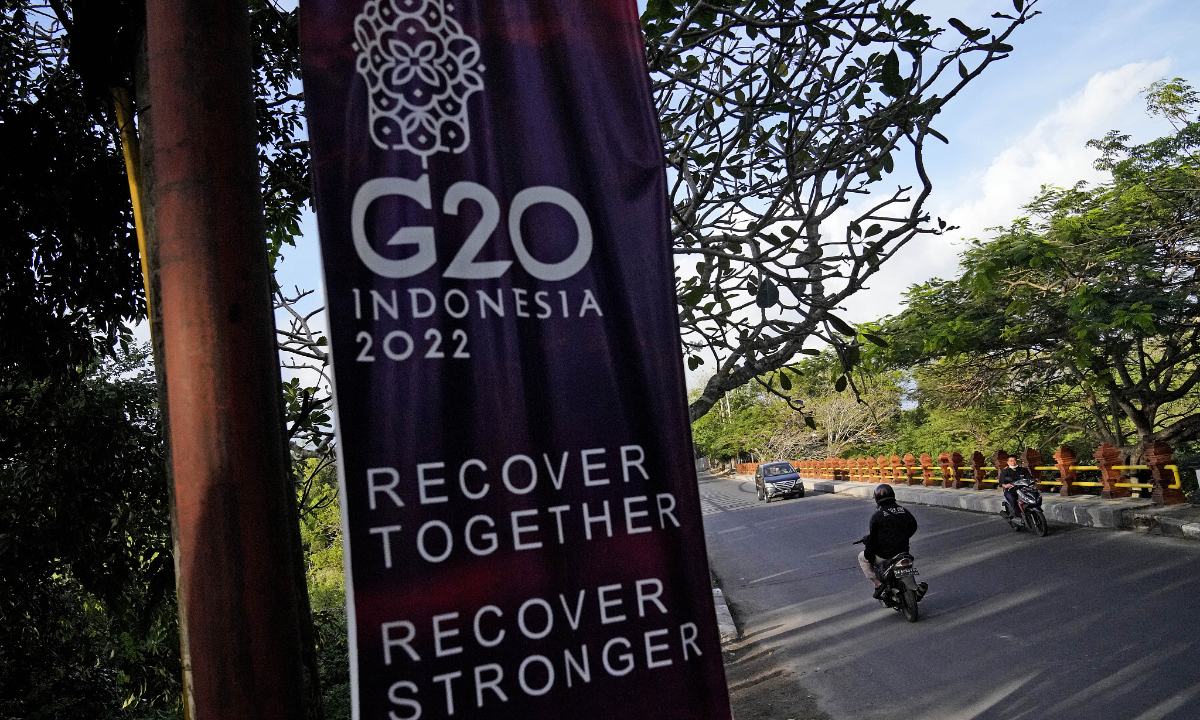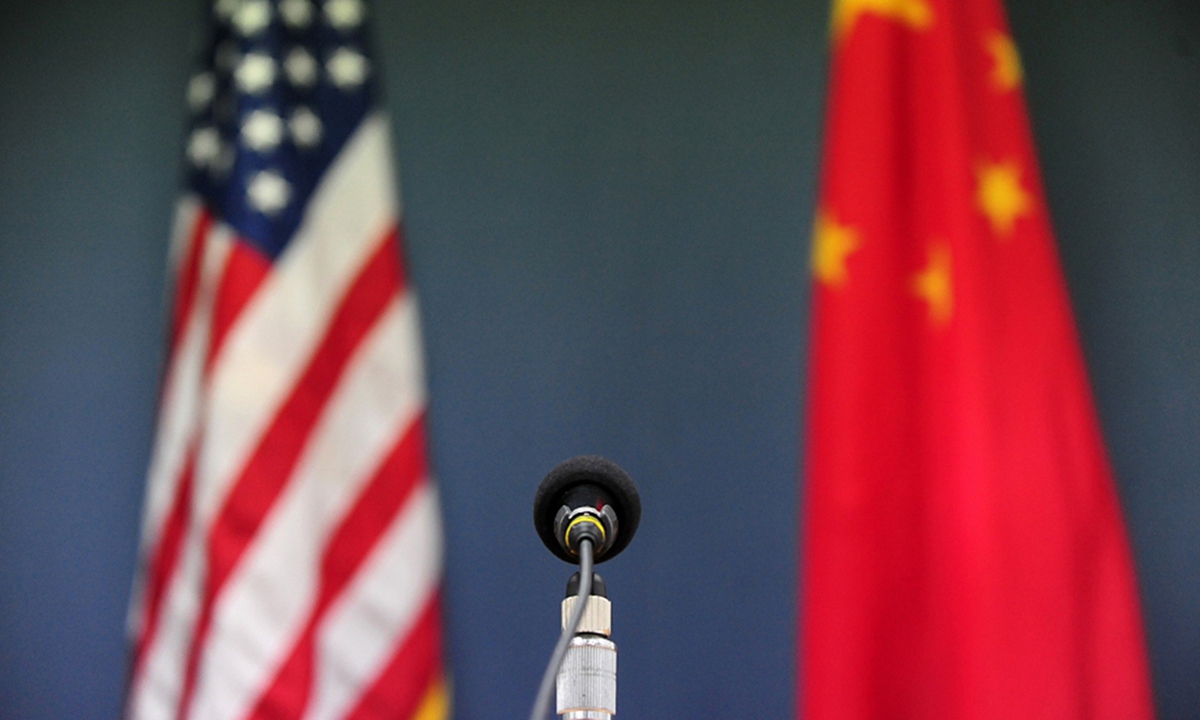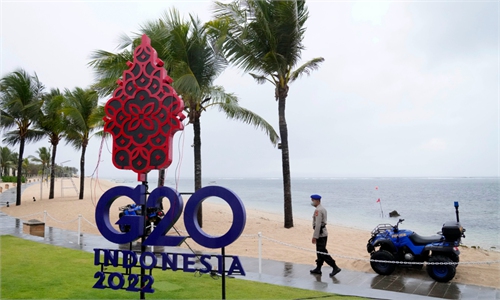Xi to attend G20, APEC to present vision; events show China's devt brings opportunities to world

Chinese President Xi Jinping will attend the 17th G20 Summit in Indonesia and the 29th APEC Economic Leaders' Meeting in Thailand and visit Thailand. Editor: Yang Ruoyu/GT Graphic: Xu Zihe/GT
The Chinese Foreign Ministry on Friday announced that President Xi Jinping will attend the 17th G20 Summit in Indonesia and the 29th APEC Economic Leaders' Meeting in Thailand next week, which experts view as a sign of bringing China's ideas on eliminating barriers and coordinating cooperation among economies and bringing new opportunities to the world through opportunities created by its development.
The president will also meet with many world leaders including US President Joe Biden, drawing widespread attention from around the world, reflecting China's increasingly paramount role in regional and global affairs.
The trip will be crucial both for China and the world as it will mark the first trip by the Chinese President following the recent successful conclusion of the 20th National Congress of the Communist Party of China (CPC), which has united the Chinese people and set out inspiring development aspirations for both China and the world. It is also the first in-person attendance at the G20 summit and the APEC summit since the outbreak of the COVID pandemic in three years, and the world increasingly turns to China and the broader Asia-Pacific region for stability and prosperity.
Chinese experts believe that in the face of rising geographical tensions, a worsening energy crisis, the lingering COVID-19 pandemic and economic recession, as well as the confrontational mentality and bloc politics of the US and its allies, emerging economies, including China, will play an increasingly critical role in the multilateral diplomatic arena, in terms of maintaining the development of globalization and free trade, enhancing regional peace and stability, and promoting the democratization of international relations.

Photo:VCG
China's role
At the invitation of President Joko Widodo of Indonesia, President Xi Jinping will attend the 17th G20 Summit in Bali, Indonesia from November 14 to 17, Chinese Foreign Ministry Spokesperson Hua Chunying announced Friday. He will attend the 29th APEC Economic Leaders' Meeting in Bangkok, Thailand and visit Thailand from November 17 to 19, Hua said.
Zhao Lijian, another spokesperson from the ministry, said on Friday at a regular press conference that the G20 Bali Summit is the first multilateral summit the top Chinese leader will attend after the successful conclusion of the 20th National Congress of the Communist Party of China (CPC), while Xi's attendance at the 29th APEC Economic Leaders' Meeting "is an important act of China's head-of-state diplomacy towards the Asia-Pacific," which "fully shows the high importance China attaches to the Asia-Pacific economic cooperation."
With growing instability and uncertainties in the world economy, regional economic cooperation in the Asia-Pacific is facing new challenges, Zhao said.
As the premier forum for international economic cooperation, the G20 need to strengthen solidarity and cooperation, coordinate macroeconomic policies, and work concertedly for strong, sustainable, inclusive and balanced growth of the world economy, Zhao said.
"APEC is an important platform for economic cooperation in the Asia-Pacific region. President Xi will deliver an important speech at the meeting, expounding China's major propositions on deepening Asia-Pacific cooperation and promoting regional and global economic growth," Zhao added.
Li Haidong, a professor from the Institute of International Relations at the China Foreign Affairs University, told the Global Times on Friday that the G20 Summit, which aims to help the world's major economies brainstorm ways to coordinate cooperation, is likely to focus on how to improve the existing multilateral financial and economic system to effectively deal with the economic problems and the tendency for depression.
There are also international realities, such as the Russia-Ukraine conflict and the climate crisis, which the G20 will likely address as well. After all, the above crises have brought uncertainty to the global economy and energy structure, and countries are hoping to use the G20 platform to reach consensus on important issues, Li said.
Wang Yiwei, director of the Institute of International Affairs at the Renmin University of China, told the Global Times on Friday that faced with the impact of the pandemic on the global supply chain and calls for "decoupling" by some Western countries in the name of security, China will continue to oppose ideologically led small cliques and firmly support globalization, as it is an objective law of development that no one can stop.
China hopes to demonstrate at multilateral diplomatic occasions such as the G20 and APEC summits that its development and opening-up, especially after the 20th National Congress of the CPC, will bring more new opportunities to the world, Wang said.
What China has always emphasized is that both the G20 or APEC summits provide a stage to promote the Global Development Initiatives (GDI) put forward by President Xi a year ago, which will benefit the world in a more effective way, Li said.
However, experts said it cannot be ruled out that the US will use arenas like the G20 and APEC summits to promote its Indo-Pacific Economic Framework for Prosperity (IPEF) and other ideology-led economic and trade alliances, and force others to take sides.
APEC is an important multilateral mechanism for bridging barriers and promoting trade liberalization between members in the Asia-Pacific region. Unfortunately, however, the biggest challenge to trade liberalization today is none other than the US, one of the cofounders of APEC, Li said.

China US Photo: VCG
China-US in spotlight
Chinese Foreign Ministry spokesperson Hua Chunying also announced Friday that Xi will hold bilateral meetings with French President Emmanuel Macron, US President Joe Biden, Senegalese President Macky Sall, Argentine President Alberto Fernández, among others, upon request.
The meeting between Xi and Biden on the sidelines of the G20 summit has been put under the spotlight as China-US relations have reached a lowest point in four decades following the US House Speaker Nancy Pelosi's provocative visit to China's Taiwan region and met with secessionists on the island as well as a series of other moves by the US to contain China.
Bilateral talks on certain areas such as defense, justice and climate change have been suspended as part of China's countermeasures to Pelosi's provocative visit to Taiwan in August.
The upcoming Xi-Biden meeting is also the first one since China slammed countermeasures.
It will also be the first in-person encounter between the two leaders since Biden ascended to the White House in 2021.
Foreign Ministry spokesperson Zhao Lijian said China views and grows its relations with the US in accordance with the three principles of mutual respect, peaceful coexistence and win-win cooperation as proposed by President Xi.
The spokesperson also urged the US to work together with China to properly manage differences, advance mutually beneficial cooperation, avoid misunderstanding and miscalculation, and bring China-US relations back to the right track of sound and steady development, which "serves the interests of both sides and meets the expectations of the world."
Before China's announcement, the White House announced the Xi-Biden meeting on Thursday (ET), saying leaders will discuss a range of regional and global issues, as well as efforts to "maintain and deepen lines of communication," responsibly manage competition, and work together on "transnational challenges that affect the international community.
Citing a senior Biden administration official, CNBC reported that the White House expects the meeting to be an in-depth and substantive conversation, but Biden will be honest about "concerns," such as the Russia-Ukraine conflict, so-called "human rights" issues, as well as the Taiwan question.
Unlike China's stable political environment after the 20th National Congress of the CPC, Biden faces the risk of becoming a "lame duck," as Republicans are very likely to win at least one of the Congress chambers. Many experts expect the Biden administration to take a tougher line on China after the midterm elections.
APEC and G20 members are concerned about the uncertainties in the current economic interactions in the Asia-Pacific region, especially the US policy on China, Li said.
However, more and more Asia-Pacific countries are becoming aware of the domestic political instability and lack of coherent policy in the US. The existing political and economic conditions in the US mean that Washington cannot devote many resources to meeting its promises, Li said.
America's efforts to tout the IPEF during the G20 and APEC summits probably won't go over well, Li said, adding that the Asia-Pacific region is one of the most economically dynamic regions in the world, and most countries here will resist having their prosperity disrupted by American interference.
Direct communication between the two leaders can set the most authoritative tone for the direction of bilateral relations at the highest level, Li said, noting that leaders are likely to make more efforts in managing differences, so that countries in the Asia-Pacific region and the world have more reasons to be optimistic about the major global concerns under the influence of China-US relations.

